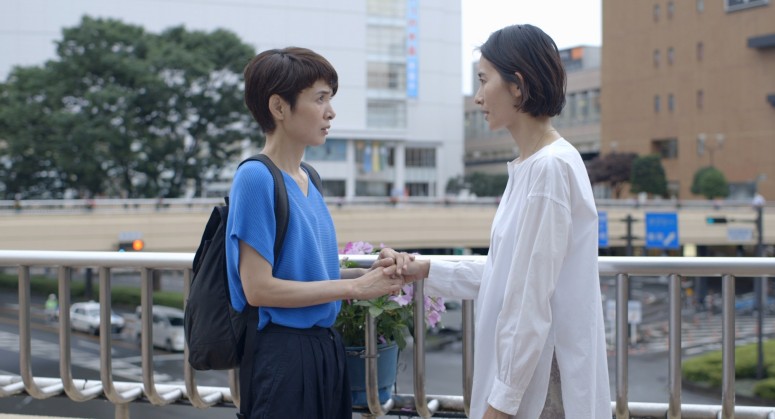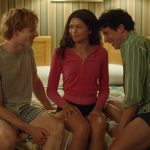Editor-in-Chief Tomi Haffety celebrates the realist cinema of Ryusuke Hamaguchi in this triptych of stories exploring coincidence and human relationships.
There is something so passionate and intimate about weaving three unrelated stories into one feature. It feels as though director Ryusuke Hamaguchi wanted his latest film to be more than what could have been three stand-alone shorts, in order to convey the true message that coincidences and surprises happen to us all. Winning the Golden Bear Grand Jury Prize, Wheel of Fortune and Fantasy is a delicate triptych of stories about women navigating unique relationships, and perfectly encapsulates all the oddities that come with adult life.
Story one, ‘Magic (Or Something Less Assuring)’ follows a young model and her best friend as they discuss their love lives in a taxi after work. The camera focuses on nothing but the women, as they pass through the streets of Tokyo and the lights of the city blend into the background, allowing the story to focus exclusively on the lively conversation. Meiko (Kotone Furukawa) is younger than her friend, Gumi (Hyunri), but they discuss Gumi’s date with excitement. Dramatic gasps and crude jokes ensue as it becomes clear that Gumi has found her perfect man, even describing the intimacy of the date as “it felt like magic”. There is a ceaseless focus on the faces and voices of the friends, creating a feeling that you, the viewer, are in the front seat of the taxi, listening along. Hamaguchi’s consistency in exploring drawn-out conversation makes for a compelling watch. After this initial conversation, the story’s focus takes a dramatic turn which begins the fracturing of this third of the film into its own distinct thirds, Meiko acting as the only constant. Visiting a young man, Kazu (Ayumu Nakajima), in an office, it becomes clear that the two share a past, and may end up sharing a future once Meiko realises that Kazu is the ‘perfect man’ Gumi spoke of. Kotone Furukawa is a phenomenal actor. Meiko’s frustration at both Kazu and her past decisions rise to the surface of the heated argument that arises. Infused with melodramatic lines about the power of love, Meiko’s angst at her compromised position leads her to run back into the Tokyo night in a climactic last effort to save her friendship with Gumi. Using three characters to carry this loaded story, Hamaguchi has created a riveting movement that requires little involvement from the watcher because the writing is so layered and full of impeccable detail.

Moving on to the second story, ‘Door Wide Open’, we follow a woman frustrated with her menial life who experiences a new sense of purpose when her young lover asks for a compromising favour. There is something suffocating about the cold hue with which this story is shot, from the young lovers’ stark apartment to the empty office of the famous professor that Nao (Katsuki Mori) visits later in the story. Nao’s aim is to tape Professor Segawa (Kiyohiko Shibukawa) in the act of seducing her so that her lover’s vengeance will be sought after the Professor failed to help him progress through university. The eccentric professor talks awkwardly with Nao when she enters his office, and the jilted nature of the conversation is quickly juxtaposed by the seductive narration of Nao reading out a sexual passage from his recent novel. The sexual tension makes one feel uncomfortable because of the paucity of reciprocation from the Professor, and it is soon made clear that Nao’s plan has failed. Showing Nao five years into the future, having lost her family as a result of the seduction attempt, there is a palpable air of tragedy and shame made manifest in her subdued facial expressions and impatience with her lover when they bump into each other by coincidence. I felt less connected to this story, and of the three would argue that Wheel of Fortune and Fantasy feels the most meandering here. Although the long dialogue between Segawa and Nao explores the intense interaction occurring in a vacuum amongst the other students at the university and their normal lives, the weird sexual energy made me feel uncomfortably awkward, but perhaps that was Hamaguchi’s aim with this unorthodox plotline.

The last story encapsulates all that is celebrated about realist cinema, cementing Hamaguchi’s position as an influential storyteller. ‘One More Time’ is a moving, empowering, and extremely poignant end to a collection of well-told stories of fortuity and relationships formed out of unlikely encounters. Whereas the previous two stories explored adverse interactions revolving around three people who were indirectly related to each other, ‘One More Time’ is focused solely on two women who form a fleeting but intense friendship based on a misunderstanding. Moka (Fusako Urabe) is visiting Sendai for her high-school reunion where she feels like an outsider who hasn’t experienced the archetypal close-knit female friendships that last into adulthood. Set in a future where a computer virus has rendered all technology redundant, which has little meaning to the story that is already so layered with human emotion, Moka is depicted as a loner who has led an unsatisfactory life, despite leaving the city to work in Tokyo. As she is leaving Sendai, she runs into an old friend Nana (Aoba Kawai) and they quickly pick up a conversation and walk over to Nana’s house for some tea. Once they arrive, however, it becomes clear that they both mistook the other for someone else, people they were both longing to see. Although Moka is obviously disappointed with the mistake, Nana offers to discuss the past and suggests a cathartic exercise of holding an imaginary conversation with the woman Moka so desperately wanted to see, her first lover. Within the imaginary conversation, true feelings are exposed and the lives of the two women become entrenched with meaning and intricacies that they have never expressed before, but found an unlikely comfort in each other. Hamaguchi channels a strong sense of substance over style through all his stories, but this movement, in particular, feels purposely simple in style, allowing for a deeper exploration into human connection.

Wheel of Fortune and Fantasy is a powerful depiction of realistic downfalls as well as celebration, invoking empathy for each character. There are neither heroes nor villains, because of the inherent understanding that everyone is made up of complex sensitivities that make for riveting stories no matter how mundane they may seem. The power of realist cinema is never lost on me simply because of the poignancy of rendering everyday interactions as things to be appreciated, offering a pause for thought and reflection on our own ways of life.




